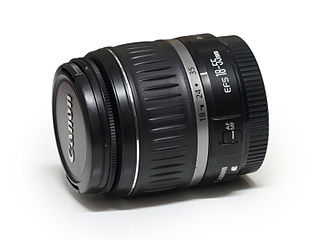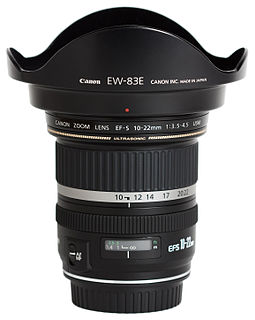This article possibly contains original research .(March 2009) (Learn how and when to remove this template message) |
 | |
| Maker | Canon |
|---|---|
| Technical data | |
| Type | Zoom |
| Focus drive | Ultrasonic motor |
| Focal length | 17–40mm |
| Crop factor | 1.0 |
| Aperture (max/min) | f/4–f/22 |
| Close focus distance | 280mm / 11in |
| Max. magnification | 0.24 (at 40mm) |
| Diaphragm blades | 7 |
| Construction | 12 elements in 9 groups |
| Features | |
| Short back focus | |
| Lens-based stabilization | |
| Macro capable | |
| Application | Ultra-Wide Zoom |
| Physical | |
| Max. length | 96.8mm / 3.8in |
| Diameter | 83.5mm / 3.3in |
| Weight | 475g / 1.1lbs |
| Filter diameter | 77mm |
| Accessories | |
| Lens hood | EW-83E |
| Case | LP1319 |
| Angle of view | |
| Horizontal | 93°–49°20' |
| Vertical | 70°30'–34° |
| Diagonal | 104°–57°30' |
| History | |
| Introduction | 2003 |
| Retail info | |
| MSRP | $800 USD |
The EF 17–40mm f/4L USM lens is a wide-angle lens made by Canon Inc. The lens has an EF mount to work with the EOS line of cameras. Other than the front element, it is sealed against dust and water, and features a diaphragm which remains nearly circular from f/4 to f/8. It is one of the few Canon photo lenses that are parfocal. [1]

In photography and cinematography, a wide-angle lens refers to a lens whose focal length is substantially smaller than the focal length of a normal lens for a given film plane. This type of lens allows more of the scene to be included in the photograph, which is useful in architectural, interior and landscape photography where the photographer may not be able to move farther from the scene to photograph it.
Canon Inc. is a Japanese multinational corporation specializing in the manufacture of imaging and optical products, including cameras, camcorders, photocopiers, steppers, computer printers and medical equipment. It's headquartered in Ōta, Tokyo, Japan.

Introduced in 1987, the EF lens mount is the standard lens mount on the Canon EOS family of SLR film and digital cameras. EF stands for "Electro-Focus": automatic focusing on EF lenses is handled by a dedicated electric motor built into the lens. Mechanically, it is a bayonet-style mount, and all communication between camera and lens takes place through electrical contacts; there are no mechanical levers or plungers.
















